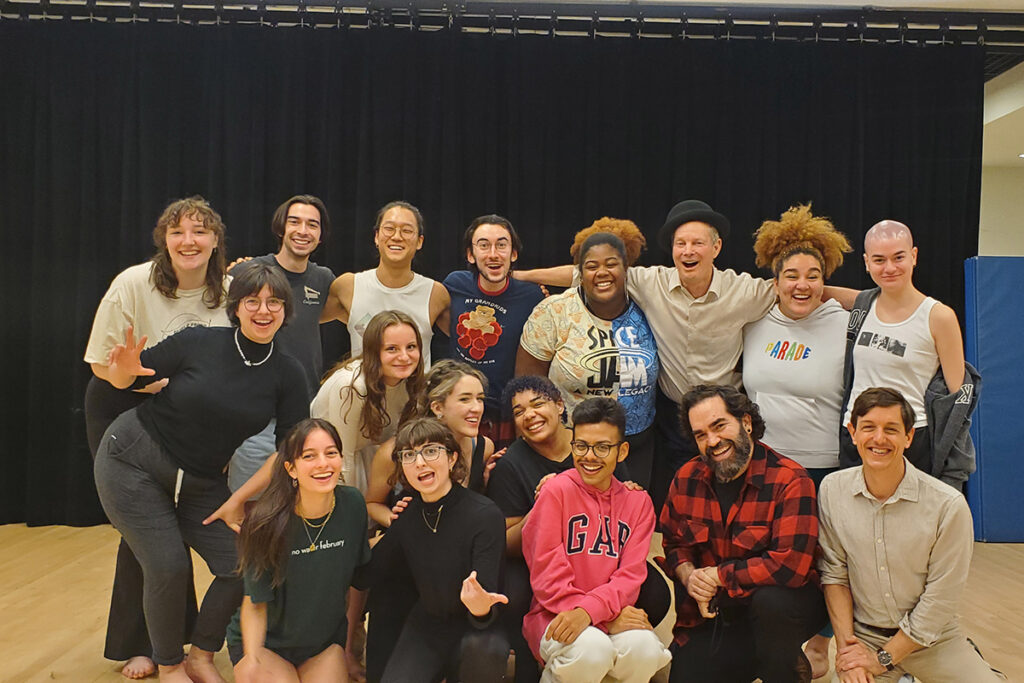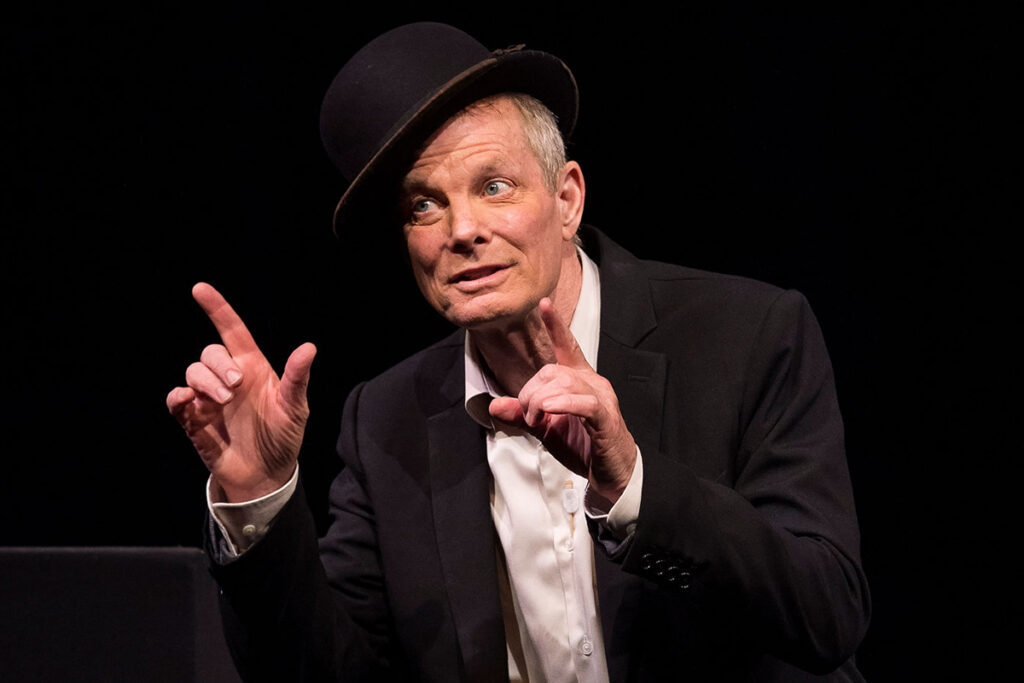Movement Matters: Students Learn from Master Clown Bill Irwin

At first, J.R. McLachlan ‘26 was a little hesitant to put on the “big pants.”
The Comedic Arts major was selected to step into an enormous pair of suspended clown trousers by Bill Irwin – clown, actor, comedian, and ArtsEmerson’s Fresh Sound Resident this fall – who was leading an exercise in Nathaniel Justiniano’s Intro to Comedic Acting class.
But as Irwin guided McLachlan through some of the fundamentals of clowning, the fear and hesitancy began to melt away, and he started to have fun with it.
“I tapped into something I already do, but I don’t display that much, [and] I hope over time I display more,” McLachlan said.
As an ArtsEmerson artist-in-residence, Irwin stuck around on campus after his critically acclaimed run of On Beckett, a show in which he pulls back the curtain on the work of Irish playwright Samuel Beckett, his fascination with it, and the art of acting and clowning.
Irwin dropped into multiple Performing Arts classrooms to lead workshops and exercises, and held a master class for students that the entire Emerson community was invited to watch. He passed along some of what he’s learned over five decades on stage, in film, and on television, in roles as varied as George in Who’s Afraid of Virginia Woolf? (for which he won a Tony Award in 2005), to Cary Loudermilk on FX’s Legion, to Mr. Noodle in the Elmo movies. He’s played both Lucky and Vladimir in Waiting for Godot, and, with fellow clown David Shiner, created the wordless slapstick show Fool Moon.
Irwin called his time working with Emerson students “cool and energizing.”
“I have developed a love for being the visiting elder,” said Irwin, 72. “I try to discipline myself to be concise and useful rather than just interesting. I just felt like the students were on their game, and I hope I was.”
One of the things Irwin said he tried to show students is how “different muscles” are deployed to make your audience laugh, and the differences between engaging an audience as a clown vs. as an actor.
“It’s a very important distinction to look at,” he said. “When you’re on stage as a clown, or on the street, you are including the audience in a whole different way in your consciousness than you are as an actor with the so-called ‘fourth wall.’ If you hear a big laugh or an isolated sneeze, as a clown, you are not only empowered, but somewhat obligated, to [acknowledge it]. You’re not doing your job if you don’t at least consider taking it in.”

Irwin said he noticed that the students seemed to be incredibly respectful of one another, something he is admiring of and thankful for – unless a role calls for it. He worked with students on cultivating humans’ bad habits of talking over one another on stage.
“They had the greatest time cutting in on each other We talked about how some playwrights write for that,” Irwin said.
Performing Arts Assistant Professor Nicole Lewis’ Scene Study class played host to Irwin, who coached students in several scenes from Blue Ridge, a dark comedy by Abby Rosebrock. Lewis said Irwin, who took the time to read the play beforehand, both complemented what she had been teaching in the class, and added a fresh take on the scenes.
“He talked about … ways even, like, a physical point in the body can completely change your perspective on the character. It informs how the character goes about pursuing the objective of the scene,” Lewis said.
Mateo Bailey ’25, a student in Lewis’ Scene Study class who performed a scene from Blue Ridge for feedback, said Irwin seemed to have an “endless, endless toolbox” at his disposal.
“His advice was very much to tune in more to the physical side of acting, my physical responses to the person next to me, as opposed to that mental side,” Bailey said. “He really emphasized this idea of finding motivation in how your body is going to respond and letting yourself be innocent to that.”
His classmate, Carina Higgins ’26, said she was struck by Irwin’s precise physicality and ability to embody any character, but she also was impressed by his willingness to give of himself to students.
“Just like his movement, he was very specific in his critiques and ways of defining certain moments, and especially the relationship between the characters in the scene,” Higgins said. “He had a lot of perfect analogies, which were very helpful.”
Justiniano, an assistant professor who brought Irwin in to two of his classes – Intro to Comedic Acting and Devised Physical Theatre – said that in addition to working with students on their craft, he brought them a piece he was working on and asked for their feedback, something that was “really profound.”
“This 72-year-old, Tony Award-winning performer stopped and said ‘What do you all think? Give me anything,’” Justiniano said.
As the College tries to “interrupt and decenter” whiteness in the classroom and across campus, it raises questions about how a straight, white man from the Baby Boomer generation can contribute, Justiniano said. “The thing to do is leverage your access and your privilege in order to lift up or platform folks of color.”
It’s been incredibly valuable for his Comedic Arts students to learn from someone who has a comedic background in both film and TV, where so much of the program is centered, as well as live performance, Justiniano said.
“That someone from the stage can come in and lift up their work as just as viable and possible, someone who does that crossover is very powerful,” he said.
Lewis said Irwin infused joy into the process, something that allowed students to work with more creativity and freedom.
“I love clowning and I love good comedy,” Lewis said. “I think the ability to do that comes from a deeply vulnerable place, and I think if we can have both of those aspects in our work, that’s genius. If the students can metabolize that in some way … that’s what creates a rich character, performance, interaction.”
Categories